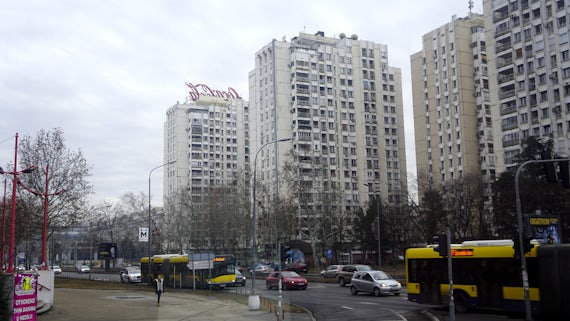Sustainable housing and urban development
7 Chwefror 2017

Dr Oleg Golubchikov from the School of Geography and Planning joined a group of senior international experts and government representatives at a sustainable housing and urban development policy workshop in Belgrade.
The workshop, organised by the United Nations (UN) and the Government of Serbia, focused on assisting countries with economies in transition to make policies for sustainable housing and sustainable cities. The workshop "Strengthening national capacities for sustainable housing, urban development and land management" has been part of a UN-sponsored project, which supports Armenia, Moldova, Serbia, and Tajikistan in developing their National Action Plans for Sustainable Housing, Urban Development, and Land Management. The project is led by the United Nations Economic Commission for Europe (UNECE) and United Nations Human Settlements Programme (UN-Habitat).
Dr Golubchikov said: “There are many common themes in urban conditions and traditions in the former socialist countries in Europe and Central Asia. While the socialist city was planned and built to maximise efficiency and social justice, many aspects of that strong impulse for urban sustainability were lost under post-socialist transition. Cities in Eastern Europe had to go through a hard, extraordinary period, which saw housing privatisation, liberalisation, rising inequalities, economic shocks, in some places even military conflicts – so developing sustainable cities was not really among these countries’ top priorities.
“These countries now face many shared challenges, including relatively low energy efficiency standards; a lack of housing affordability and non-commercial housing; a fragmented system of spatial planning; and problems with the maintenance of multifamily housing estates. Smart policies are needed for making housing and cities smart and sustainable, while embracing sustainability in its different dimensions – economic, social, and environmental. I am delighted to see that this agenda has been taken forward in the National Action Plans we have discussed in Belgrade. These action plans represent a major step in these countries towards the improved liveability of their cities, national institutional and capacity building, and will contribute to the global urban sustainability agenda.”
The workshop in Belgrade provided the national governments an opportunity to report progress with their National Action Plans, receive feedback, and discuss further ideas with the group of international experts. Dr Golubchikov also gave a talk on the policy applicability of the concepts of sustainable housing and urban development. He reflected on his experience of leading a number of UN reports on sustainable housing, energy efficient housing, and low carbon cities and advocated a holistic approach, while also stressing the importance of building on successful local legacies.
The UN project supports the New Urban Agenda adopted at Habitat III in Quito, Ecuador in October 2016. Dr Golubchikov has worked as part of the team of chief policy experts commissioned globally to draft the New Urban Agenda and he also co-authored the HABITAT III Regional Report for the UNECE Region. The New Urban Agenda will now set global standards of achievement in sustainable urban development in the next two decades, rethinking the way we build, manage, and live in cities.
